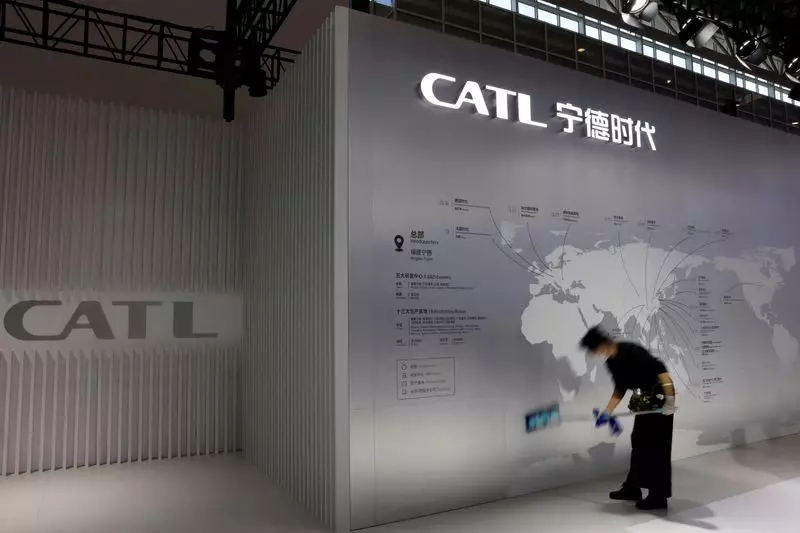The recent announcement by the U.S. Defense Department regarding the addition of Chinese tech giants to its military-linked blacklist has stirred significant financial and political consequences. Included on this list are major players such as Tencent Holdings, renowned for its vast presence in gaming and social media, and CATL, the leading manufacturer of electric vehicle batteries. Alongside these giants, other companies engaged in diverse tech sectors, such as Changxin Memory Technologies, Quectel Wireless, and Autel Robotics, were also named. This comprehensive list, formally referred to as the “Section 1260H list,” aims to identify firms that potentially collaborate with or support the military ambitions of the Chinese government. With 134 names now documented in this annual update, the ramifications extend beyond mere corporate reputations.
The immediate response from financial markets has been telling. Tencent, for example, experienced a plummet in stock value, declining as much as 8% in U.S. over-the-counter trading and more than 7% during Hong Kong sessions. Such sharp drops reflect investor apprehension about the potential consequences of this designation—despite the company’s vehement claims that it operates independently of military affiliations. Similarly, CATL’s shares, listed in Shenzhen, fell by over 5%. These stock movements underscore the palpable anxiety gripping investors who closely monitor the evolving dynamics of U.S.-China relations and the tech sector’s entanglement with geopolitical narratives.
In the wake of the announcement, the companies included in the blacklist have been quick to respond. Tencent has labeled its inclusion a “clear mistake,” stating its lack of association with military operations. This sentiment was echoed by CATL, which maintains a focus on civilian applications in its battery technology. Quectel, too, released a statement denying military involvement and expressed its intention to appeal to the Pentagon for reconsideration. The consistency in these corporate reactions highlights a strategic communication effort to mitigate the damage inflicted by association with a military designation that could have far-reaching implications on international operations and collaborations.
This updated blacklist is part of a larger pattern of actions taken by the U.S. to counter what it perceives as security risks posed by Chinese firms. By intensifying scrutiny and restrictions, the Defense Department is not merely identifying a few high-profile entities; it is aiming to draw a broader landscape of vulnerabilities and potential threats. The listing serves as a cautionary signal to American firms about engaging with Chinese companies that are now under the intensified spotlight of Washington’s national security interests.
Experts like Craig Singleton of the Foundation for Defense of Democracies emphasize the seriousness of these listings. They signify a shift from treating these companies as mere commercial entities to recognizing them as critical components in China’s military modernization efforts. Singleton warns that the implications extend far beyond investment bans, hinting at a fundamental realignment in how U.S. industries should assess the potential risks of engaging with Chinese corporations.
The pressure exerted by U.S. lawmakers on the Pentagon to include certain firms illustrates the political currents influencing these designations. As domestic tensions regarding technology transfer, data security, and military preparedness escalate, lawmakers have become increasingly vigilant about ensuring that their nation’s technological assets do not inadvertently benefit foreign adversaries. High-profile firms like Ford, which is forging partnerships with companies like CATL for battery production, may find themselves scrutinized under this evolving legal framework.
The stakes were further clarified by experts like Jefferies analysts, who noted that while the immediate ramifications of the blacklist may not seem critical, the underlying implication is significant. Specifically, companies designated on this list could be subjected to more severe restrictions or even sanctions imposed by various government departments, adding complexity to their operational landscape.
As the U.S. Defense Department’s newly updated blacklist emerges, firms affiliated with Chinese technology find themselves at a crossroads. The implications are vast—not just for the companies themselves, but also for the broader geopolitical context that defines U.S.-China relations. The stringent designations act as both a warning and a turning point for future corporate engagement across borders. The landscape is shifting, and entities must navigate the challenges posed not only by market competition but also by the intricate web of international relations that increasingly complicates global business strategies. With growing sensitivity around security implications, the focus now turns to how companies will adapt in an environment where military associations could determine the viability of their operations on a global scale.

